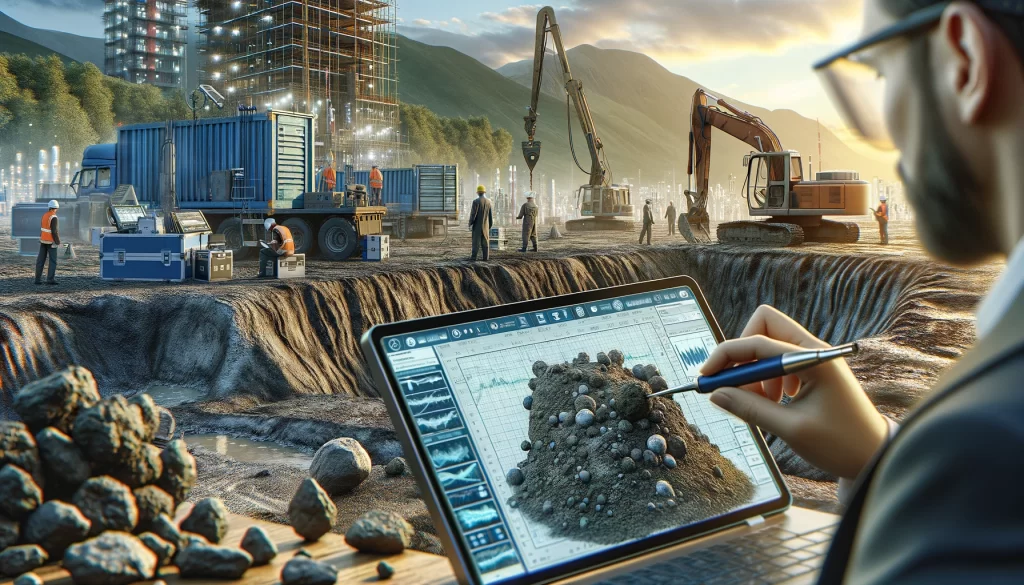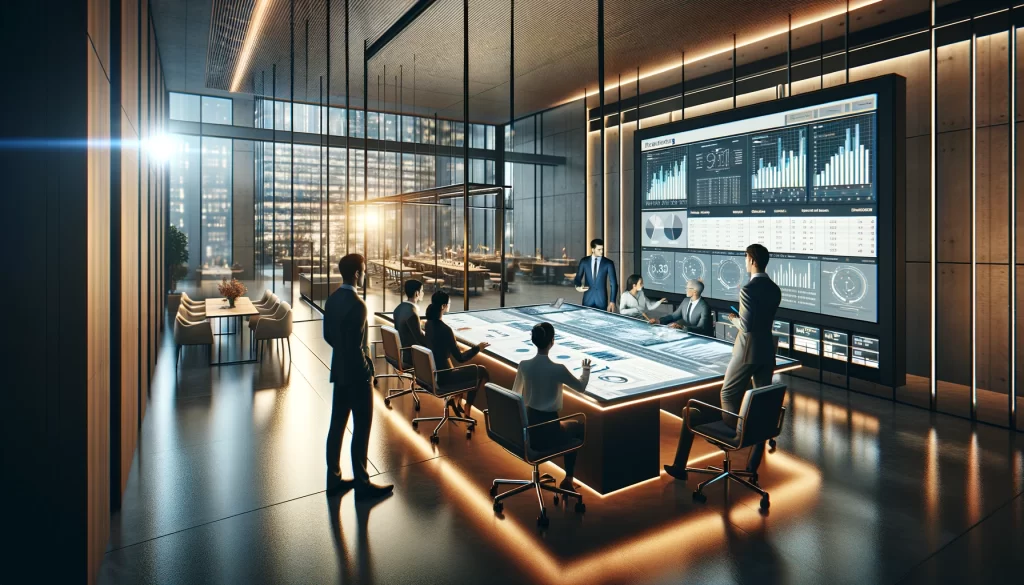Unveiling the Benefits of AI in Pre-Construction
A I • May 02,2024

Imagine construction projects unfolding smoothly, free from delays, budget overruns, and unforeseen costs. In a world where meticulous plans, precise calculations, and minimized risks guarantee seamless operations and triumphant project finishes. Thanks to the rapid introduction of artificial intelligence (AI) into the construction sector, this world is becoming a reality.
According to forecasts by Straits Research, the global AI in construction market size was valued at USD 530.24 Million in 2023 and is expected to grow to USD 5678.72 Million by 203, with a projected CAGR of 34.5% from 2024 to 2032. The future of construction is knocking, and it has an AI brain.
Pre-construction stage is like the groundwork for your project. Get it right, and the rest is smooth sailing! Intricate planning, cost estimates, risk assessment, and collaboration between everyone involved—it all starts in pre-construction. With the integrating AI in the pre-construction phase, the critical process is optimized to be more efficient, accurate, and informative.
Let’s delve deeper. To gain a clearer picture of AI’s transformative impact, let’s explore its applications in pre-construction.
AI in Pre-construction: Driving Efficiency at Every Stage
As we mentioned, the pre-construction phase lays the groundwork for a successful project. But how exactly is AI transforming this critical stage? We’ll delve into its applications throughout the different pre-construction processes.
1. Soil Investigation
Ever dream of living in a skyscraper that sways in the breeze like a willow branch? Probably not! Before any building reaches for the sky, understanding the ground beneath it is key. Soil testing is an essential step in this process, as understanding the soil’s characteristics is vital for ensuring the structure’s stability and the safety of its users.

Traditional soil testing methods, which involve drilling wells, collecting soil samples, and testing them in labs, can be time-consuming. Artificial intelligence provides a more efficient, accurate, and cost-effective alternative in this instance. AI algorithms analyze vast amounts of geospatial data—satellite images, soil maps, topographic data, and geophysical survey results—to provide this information.
So, what does this mean for you? Here’s the lowdown:
● Faster and more accurate results: No more waiting for weeks to get the green light on your dream project. AI can assess soil characteristics quickly and precisely, saving you time and money.
● Identifying potential problems: Think landslides or sneaky underground water. AI can sniff out these hidden dangers before they become major headaches (or worse!).
● Building smarter, not harder: With a deeper understanding of the soil, builders can choose the best materials and techniques for the job. It’s like having a recipe perfectly tailored to your specific ingredients!
● Eco-friendly construction: AI can help create more sustainable building practices, minimizing the impact on the environment. Because building a dream home shouldn’t come at the expense of the planet, right?
Real-life Examples:
In a groundbreaking project, Artificial Intelligence (AI) successfully predicted soil layers in Babol City, Iran. This project utilized a Multi-Layer Perceptron (MLP), a type of AI, trained on data collected from 45 boreholes across a vast area. By analyzing depth and coordinates, the AI learned to identify different soil layers with a remarkable 90% accuracy.
While AI’s ability to analyze soil composition for construction projects is impressive (as seen in the case of Babol City, Iran), its applications in geotechnical engineering extend far beyond. Researchers are now leveraging AI’s power to tackle another critical challenge: predicting landslides.
Traditional landslide prediction methods, while accurate, are time-consuming, resource-intensive, and lack interpretability. To address these limitations, UCLA researchers developed a new AI technique using Superposable Neural Networks (SNNs). Their method not only improves landslide prediction accuracy but also offers insights into the factors driving landslide risk. The model achieved accuracy on par with traditional methods, but with the added benefit of identifying key variables influencing landslide risk.
2. Cost Estimating
Mountains of paperwork, calculators, sleepless nights… Project cost estimation can turn into a real nightmare, as it requires careful analysis of numerous factors, risk assessment, and constant information updates.
Fortunately, artificial intelligence (AI) level up any cost estimating game, offering more accurate, efficient and reliable solutions. Here are some of the key benefits of using AI for cost estimation:

● No More Guesswork: No offense, but AI could be more accurate. Don’t underestimate human expertise, but AI has unique abilities when it comes to data analysis. Here’s why: it can process vast amounts of information, identify hidden patterns and make predictions with much greater accuracy than humans.
● Budgeting Like a Boss: AI can automate many tasks associated with cost estimation, such as data collection, analysis, and report generation. This can free up the time and resources of human estimators to focus on more complex tasks.
● Crystal Ball Budgeting: AI systems provide clear explanations of how they make their predictions. Enhanced transparency throughout the cost estimation process fosters stakeholder trust in the final figures.
AI-powered cost estimating tools are already being used by some companies in the construction industry.
Real-life Examples:
Coastal Construction, a seasoned contractor with a rich history in South Florida, leverages Togal.AI, an AI-powered pre-construction software. This revolutionary tool utilizes deep learning technology to automatically analyze plans, detect objects, and generate takeoffs in seconds.
Coastal’s estimators experienced a staggering 98% time savings, slashing their takeoff time by 14.5 hours per plan set. Additionally, Togal.AI’s 98% accuracy in takeoffs, compared to the previous 97% with manual methods, reduced the risk of costly errors and ensured competitive bids.
3. Bidding and Negotiation
Let’s be honest. The traditional way of dealing with bids and contracts was a time-consuming mess, riddled with errors. AI steps in as a game-changer, offering contractors and project owners innovative tools to achieve better results.
● Faster Evaluations: AI can automate the evaluation of bids from contractors by analyzing various parameters such as cost, schedule, qualifications, and past performance. This not only saves time; but what is very important, it increases the objectivity of the assessment.
● Better Decisions: Intelligent systems can become your secret weapon in the bidding and negotiation game. For contractors, AI helps identify the most profitable pricing strategy, ensuring they get the best bang for their buck. Project owners, on the other hand, can leverage AI to effectively compare proposals and find the sweet spot between budget and quality.
● Contract Clarity Through NLP: Ditch the contract headaches! NLP technology can dissect those confusing legal documents and pull out the important stuff. This lets you review contracts faster and discover any hidden dangers, like sneaky liabilities or opportunities to negotiate a better deal.
Real-life Examples:
Teichert, a private construction company, leverages cutting-edge AI to streamline bidding. They integrated InQuarry, a robust platform, into their operations as their digital construction assistant. Its “Spot Check” feature, powered by machine learning, analyzes past projects to identify potential errors or omissions in current bids. With the assistance of this AI review, Teichert can optimize bidding processes and put forth more competitive proposals.
Kärcher Global Services, a subsidiary of the Kärcher Group, implemented Procure Ai’s solution, automating negotiation, execution, and award processes. Intelligent routing further optimized efficiency by pre-selecting requisitions based on price and commodity group factors. This saved Kärcher valuable time and ensured they found the most suitable suppliers.
4. Permitting and Approvals
Alright, we’ve crossed the design finish line, but before we can break ground, we need to navigate the permitting and approvals gauntlet. Traditionally, this has been a paperwork-heavy, time-consuming, and error-prone ordeal, but let’s not fret—AI is here to transform this bureaucratic maze into a smooth and efficient process.

Your Building Code Compliance Guardian
Imagine having an AI sentinel meticulously scrutinizing your construction documents, ensuring they adhere to every building code regulation. This AI watchdog eliminates the risk of human error and the costly delays that arise from non-compliance.
AI-powered tools can:
● Code Check on Autopilot: AI can scan your blueprints, identifying potential code violations, saving you valuable time and resources.
● Instant Feedback Loop: Get real-time warnings about potential problems before you submit, so you can make quick fixes and get approved faster.
● Stay up-to-date: Building codes are like fashion trends—constantly changing. AI keeps your plans up-to-date with the latest regulations, so you don’t get stuck in permit purgatory.
Your Permitting Process Navigator
AI goes beyond code compliance, transforming into your intelligent partner throughout the permitting process:
Streamlined document management: With the help of AI, your permit application documents can be organized and digitized, allowing for easy access for review by multiple agencies.
Proactive communication: AI analyzes historical data to predict potential roadblocks and suggests strategies for smoother permit processing.
Enhanced collaboration: With AI, communication between you, architects, engineers, and government agencies becomes seamless, ensuring that everyone is on the same page.
By embracing AI, you can transform the permitting process from a tedious hurdle into a streamlined and efficient step toward achieving your construction goals.
Real-life Examples:
Vienna’s building department is leveraging artificial intelligence (AI) through BRISE project by Cloudflight to streamline the submission and processing of building permit applications. This innovative tool automates many previously manual tasks, saving time and resources for both applicants and staff.
AI solution classifies documents, identifies missing or incomplete data, extracts key information, verifies compliance with building codes, and digitally archives documents. This makes the application process more convenient, faster, and transparent, promoting better understanding and trust between applicants and the city.
The Future of Construction: Symphony of Efficiency Powered by AI
AI is revolutionizing pre-construction, the critical foundation for successful projects, optimizing processes, enhancing accuracy, and driving efficiency at every stage. This isn’t about robots taking over the construction site—AI is here to give human pros a helping hand.
From soil investigation to cost estimation, bidding and negotiation, and permitting and approvals, AI is empowering construction professionals to achieve game-changing efficiency, accuracy, and transparency. AI is not just about replacing human workers; it’s about augmenting their capabilities and enabling them to focus on higher-value tasks.
This symbiotic relationship between humans and AI is paving the way for a future of construction where projects are completed faster, more cost-effectively, and with greater adherence to safety and sustainability standards. AI is not just a tool; it’s a catalyst for innovation, transforming the construction industry into a model of efficiency, precision, and collaboration.